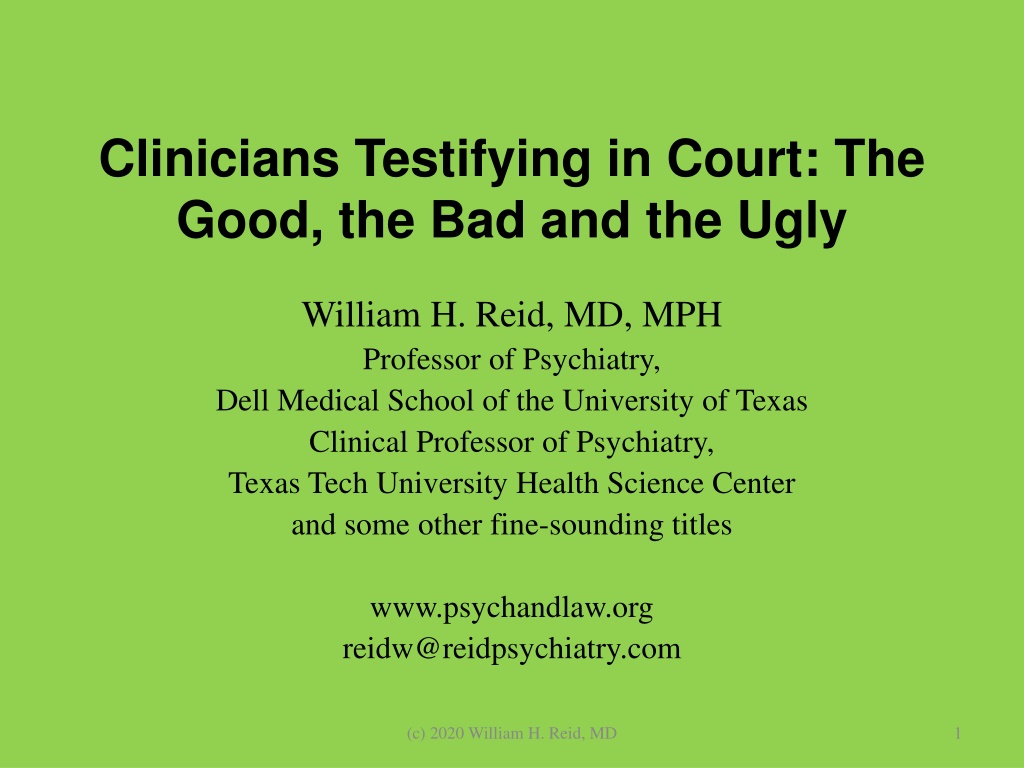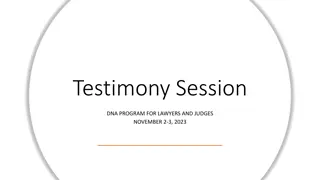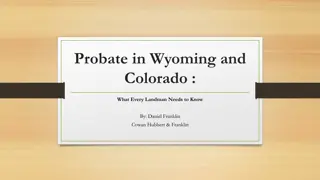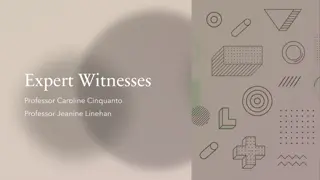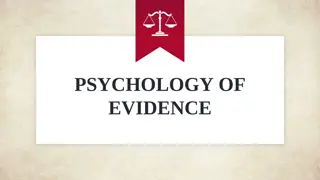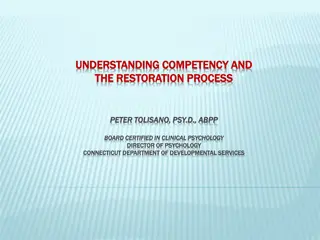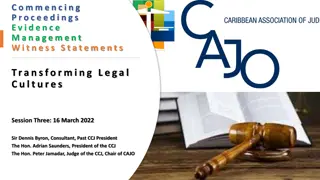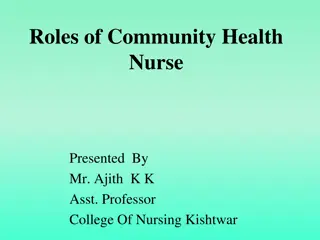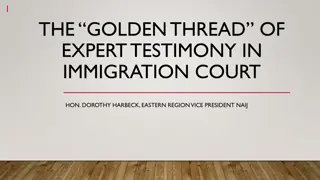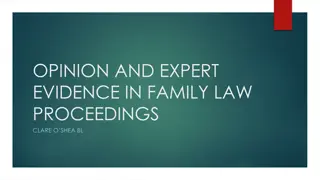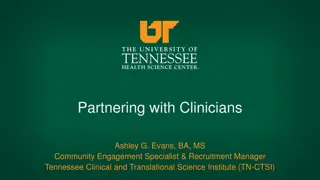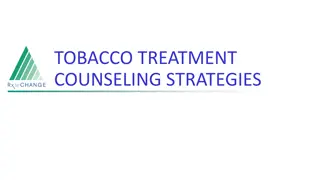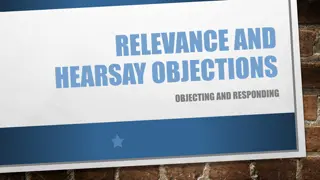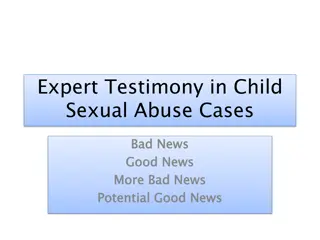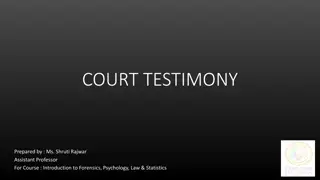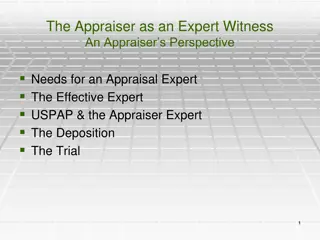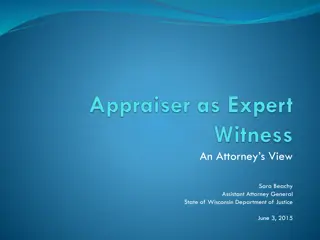Understanding Clinician Testimony in Legal Proceedings
This presentation by William H. Reid, MD, MPH provides insights for clinicians testifying in civil and criminal cases. It covers legal processes, ethical considerations, and principles of testimony. The content also distinguishes between expert and ordinary witness roles, and highlights the adversarial nature of US court systems.
Download Presentation

Please find below an Image/Link to download the presentation.
The content on the website is provided AS IS for your information and personal use only. It may not be sold, licensed, or shared on other websites without obtaining consent from the author. Download presentation by click this link. If you encounter any issues during the download, it is possible that the publisher has removed the file from their server.
E N D
Presentation Transcript
Clinicians Testifying in Court: The Good, the Bad and the Ugly William H. Reid, MD, MPH Professor of Psychiatry, Dell Medical School of the University of Texas Clinical Professor of Psychiatry, Texas Tech University Health Science Center and some other fine-sounding titles www.psychandlaw.org reidw@reidpsychiatry.com (c) 2020 William H. Reid, MD 1
EDUCATIONAL OBJECTIVES At the end of this presentation, clinician-participants will be better prepared to Understand legal and judicial processes relevant to clinician testimony in civil and criminal cases, Understand important ethical principles to be considered by clinicians involved in testifying, and Understand principles of fact and expert testimony. (c) 2020 William H. Reid, MD 2
I am not a lawyer. Yo no soy un abogado. Ich bin kein Anwalt. . . . Je ne suis pas avocat. Ixnay on the awyerlay. Please don t construe this as legal advice. (c) 2020 William H. Reid, MD 3
Gutheil TG, Drogin EY (2012). The Mental Health Professional in Court: A Survival Guide. Washington, DC: American Psychiatric Publishing. If you don t want to spend $93.12 for it on Amazon, find the just-as-useful 1998 version: Gutheil, TG: The Psychiatrist in Court: A Survival Guide. Washington, DC: American Psychiatric Publishing. The principles apply to all clinicians. (c) 2020 William H. Reid, MD 4
We wont focus today on expert witness roles, though they ll be mentioned. They are different from ordinary witness roles. We re not talking about you being sued, or accused of malpractice. That's a different talk. But some of these principles apply. (c) 2020 William H. Reid, MD 5
An Adversary System US courts are adversary, and the witness process is question-and-answer. The lawyer for one side will like what you have to say and ask easy questions. The other won't like it and will ask much harder ones, try to trip you up, and/or dilute your comments. (c) 2020 William H. Reid, MD 6
Everything were talking about today refers to trial courts. Those are the first level of court and include almost every trial you see on TV. Appeals courts & supreme courts never involve juries or witnesses, just judges/justices, because appeals are always brought on technicalities of the law, not matters of fact. (c) 2020 William H. Reid, MD 7
Ethics of Testifying It is not unethical, in my opinion and that of both APAs, to testify truthfully to facts. (Note the legal definition of fact. ) Opinions must be separated from facts. You may choose not to testify in a friend s case or about a particular topic, but if you receive a judge s subpoena (not just a lawyer s subpoena), you must do so. Expert witnesses (not fact ones) routinely avoid cases with conflicts of interest. (c) 2020 William H. Reid, MD 8
Factfinder/Trier of Fact The factfinder, usually a jury, is the entity that decides who s telling the truth. If there is no jury in the trial, the judge is the factfinder (a bench trial). The judge is always the trier of law as well, which means he/she determines the law of the case (not the facts or truth ) and what the jury is allowed to hear. I ll simply say jury from now on, even if a judge is the factfinder. (c) 2020 William H. Reid, MD 9
Be Aware of the Vocabulary You don t have to be a lawyer, but A legal fact is not true unless the judge or both sides say(s) it s true (See next slide.) Our concept of consistent with is often misunderstood as a certainty in court. Standard of care (SOC), insanity, incapacity, incompetency, duty, reasonable medical certainty, proved, and other terms have specific legal definitions that are different from social or medical usage. (c) 2020 William H. Reid, MD 10
What the Heck is a Fact? This is going to sound obtuse. A legal fact is not true until a judge says it s true or both sides agree that it s true. Facts are often convenient fictions, and may differ a lot between the litigating sides. Cases are decided when one side proves (or can t prove), often by a mere 51% probability, that its facts are true. (c) 2020 William H. Reid, MD 11
Facts, cont. In criminal cases the prosecution (government) must prove its facts (allegations against the defendant) beyond reasonable doubt. In civil cases, the plaintiff must prove its facts (including allegations against the defendant) to a preponderance of the evidence (50+%) (occasionally to a clear and convincing degree, 75-80%). There are nuances; don t get picky. (c) 2020 William H. Reid, MD 12
Kinds of Witnesses For our purposes, there are only two: Fact and Expert. The difference is not what you might think. (c) 2020 William H. Reid, MD 13
You are a fact witness unless the judge says otherwise. As a fact witness you Can only testify to what you know. It s often a recitation of the clinical record, what you did, saw, heard with your own ears, etc. Cannot offer opinions or interpretations. Can be compelled to testify. Are usually treated politely. Don t get paid. (It s your civic duty, but your expenses are covered. Sort of.) (c) 2020 William H. Reid, MD 14
You are an expert witness if the judge says so, BUT, You will have been told in advance that you will be an expert witness. You will have reviewed everything relevant to the psychiatric aspects of the case. The other side will know you re being called to testify as an expert witness. Continued . . . (c) 2020 William H. Reid, MD 15
continued from last slide . . . You may have written an expert report. Your credentials will be examined in court by both sides to establish (or refute) your expertise (a process called voir dire). The lawyer who called you has agreed to pay you for your time. (c) 2020 William H. Reid, MD 16
Voir Dire The process of qualifying an expert (or a juror) to participate in the trial. Does not apply to fact witnesses. Lets both sides explore your background. The judge decides whether or not you are qualified to testify. Can involve embarrassing questions. Is public (if done in open court). (c) 2020 William H. Reid, MD 17
As an expert witness, you Can offer opinions and interpretations (within your expertise). Strive for objectivity. Must base your opinions in valid and reliable science or substantial, relevant experience. Can consider hearsay in forming opinions. Cannot be compelled to testify. Get paid by the lawyer who retained you. (Be sure you have that agreement in writing.) (c) 2020 William H. Reid, MD 18
Dont confuse any of this with being a friend of the court. That s completely different. (c) 2020 William H. Reid, MD 19
Lawyers sometimes try to finagle opinions out of fact witnesses, especially doctors. That s sneaky, but sometimes allowed. There are several reasons you should resist or refuse to offer opinions & interpretations. (The judge will probably support your refusal.) Here they come . . . (c) 2020 William H. Reid, MD 20
You havent reviewed everything relevant to the case. You have no idea what other facts in the case may be, or what information you lack. You may not be expert in the questions asked. You didn t sign up to be an expert witness, and thus haven t prepared in anticipation of same. You haven t been qualified (approved) by the judge to be an expert witness, nor has any side had a chance to challenge your expertise. You aren t being paid for your time. (c) 2020 William H. Reid, MD 21
If the judge says its OK to testify about your opinions and other things reserved for expert witnesses, you re entitled to ask the judge (very politely) to put the material in the previous slide on record, including your right to be paid for your time in court. It s usually best not to make it a big deal, but DO let the jury know the limits of your review and knowledge. (c) 2020 William H. Reid, MD 22
What Cases Need Fact Testimony? Criminal (often defense, for history or mitigation) Malpractice (medical record, pt. hx, dx, sx, rx.) Emotional Injury (ditto) Fitness/Disability/Financial Capacity (ditto) Commitment/Involuntary treatment (ditto) Separate from expert opinions in the same cases. (c) 2020 William H. Reid, MD 23
Subpoenas Sound scary. Command or demand that you appear, send records, or both. Two general kinds: Lawyer and judicial. Judicial subpoenas are much more serious. They have teeth. Never ignore a subpoena. If you re unclear about what to do, call your own lawyer. (c) 2020 William H. Reid, MD 24
Not Your Lawyer The lawyer who calls you to testify, or who enlists your help in a case, is not your lawyer. He/she may be friendly and seem helpful, but his/her duty and allegiance is solely to the client. There is no duty to you, even to be truthful with you, and that lawyer is not the person from whom you should seek your own legal advice. (c) 2020 William H. Reid, MD 25
Treater vs. Witness vs. Expert Witness It is generally unethical to be an expert witness in a case involving your own (or a former) patient or the patient s family member. It is not unethical to be a fact witness, BUT There are credibility and clinical consequences of mixing treatment & testimony in the same case, even simple disability reports and commitments (both of which may involve expert opinions). (c) 2020 William H. Reid, MD 26
TreaterWitnessExpert, cont. I m not saying never participate in disability reports or commitments for your patients. You are often asked only for your findings and records, which are matters of fact, not opinion. I do recommend that evaluations and offering opinions in matters involving civil rights (commitments, involuntary treatment, competency, etc.) and dangerousness be done by independent evaluators. (c) 2020 William H. Reid, MD 27
Be Aware of Clinical Consequences Strassburger LH, Gutheil TG, Brodsky A (1997). On Wearing Two Hats: Role Conflict in Serving as Both Psychotherapist and Expert Witness. Amer J Psychiatry 154:448-456. Not just for psychotherapists, and many of the principles apply to fact testimony as well as expert testimony. (c) 2020 William H. Reid, MD 28
Pro Se Requests and Cases Pro se refers to cases in which a litigant is his/her own lawyer. They re usually very sticky. Be cautious about becoming a fact witness for pro se litigants. Use extreme caution in becoming an expert for pro se litigants. (Bill sez, Don t do it! ) Never be an expert witness for your own patient. (c) 2020 William H. Reid, MD 29
Testimony Itself (finally!) Deposition testimony is slightly different from trial testimony. We ll get to that in a moment. For now, here are lots and lots of general points about testifying in court: (c) 2020 William H. Reid, MD 30
Dress the Part; Look Professional It s a matter of respect. It s a matter of credibility. Dress conservatively. Guys, wear a coat & tie. Avoid bling. Remove facial piercings. If you have facial tattoos, brands or decorative scarification, consider a veil. (c) 2020 William H. Reid, MD 31
Be Prepared Insist on some preparation by the lawyer who has called you, even if only by phone. Don t accept Just meet me at the courthouse and bring your records. If you re being called to give opinions (i.e., as an expert), be sure you have adequate and complete information, double the lawyer preparation time, and charge for it. Don t be shy about the above. The lawyer understands, I promise. (c) 2020 William H. Reid, MD 32
Testifying You are there to answer questions, not to proselytize or pontificate. Juries usually like doctors, but they hate wordy or arrogant ones. In court, the lawyer who called you goes first (but second in depositions). Pause very briefly before answering, in case of objections. The lawyer asking the question almost always knows the answer beforehand, and may know more than you about that narrow topic. (c) 2020 William H. Reid, MD 33
Testifying, cont. Explain clearly, in high-school words, but don't talk down to the jury. Good analogies are nice. Talk to the jury (or judge if there is no jury), not to the lawyer asking the questions. Be concise unless you re asked to explain, then explain concisely and to the specific point (but feel free to say I don t know, or there s no concise answer to that question ). (c) 2020 William H. Reid, MD 34
Testifying, cont. Avoid never and always. Don t be sucked in by demands to Answer yes or no. There are at least three other acceptable answers: I don't know, It s not a yes-or-no question, and It would be misleading to answer yes or no. The lawyers and/or judge may argue. Stay out of it and then do as the judge tells you. The above also applies to judges demands for yes or no, but be polite; it s the judge s playpen. (c) 2020 William H. Reid, MD 35
Testifying, cont. Watch out for misquotes and incomplete quotes, of either your words or the record. Lawyers often ask the same question in different ways to get the answer they want. Unless you think you've made a mistake, be very consistent. Never get mad or irritated with the opposing lawyer. (You re above all that.) Don't take anything personally. (c) 2020 William H. Reid, MD 36
Testifying, cont. Do not try to give ultimate answers (things the judge or jury is to decide, such as He was insane at the time ; She is competent ; She meets the commitment criteria ; It wasn't malpractice ) unless a lawyer or judge asks you specifically. (c) 2020 William H. Reid, MD 37
Deposition Testimony Depositions ( discovery depositions ) are most characteristic of civil cases (e.g., lawsuits). They give the lawyers a chance to explore the other side s case, decrease last-minute surprises, and often allow cases to settle without a trial. They re not remotely like TV depositions. You are the deponent. In depositions, unlike trials, the opposing lawyer questions you first. (c) 2020 William H. Reid, MD 38
Depositions, cont. Much less formal than trials or court hearings. Don t be lulled by the informality. You re under oath, and the results are public. Answer/speak as if you were in a courtroom. If video-recording, answer to the camera. OK to dress less formally unless there s video. If you plan to come in scrubs (or leave your tongue stud in), ask about video beforehand. Avoid being deposed in your own office. (c) 2020 William H. Reid, MD 39
Special Note About Child Custody Child custody evaluation and testimony is highly specialized, for very good reason. If you re not child-trained, don t do it. Competency to parent is less specialized, but can quickly become a morass. Never become involved in the above as an expert without assessing all the parties, and try hard not to be pulled into your patients cases. You never have all the facts. (c) 2020 William H. Reid, MD 40
Please leave your tips in the jar beside the door. (c) 2020 William H. Reid, MD 41
